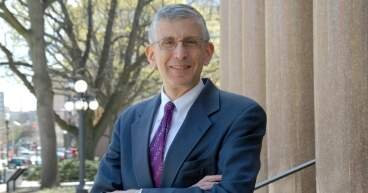Public Spending, ECONOMIC OPPORTUNITY FOR ALL
GSI Analysis: New Jersey’s Missing Budget “Surplus”
By Charles Steindel, Ph.D.
Our state’s finances have long been singled-out for remarkably low levels of resources available to meet spending needs when revenues run short. The main part of our cash reserve is called the budget “surplus.” In addition, some revenues are automatically shifted to the “rainy-day fund.” It is well known that the sum of these is very low, relative to our state budget. It would be desirable for the state to have more cash, but it should be understood that the use of cash reserves doesn’t solve budget problems: it merely postpones them by allowing operations to continue without immediate tax hikes.
Charles Steindel, Ph.D.
Obviously, if the state had a much larger cash reserves (a number more in line with the size of budget and the experience of other states would be over $4 billion, about 3 times what New Jersey has) some of the unusual decisions that have been made this year might not have been made. Most notably, the odd extension of fiscal year 2020 to September 30 could likely have been avoided. The postponement of final personal and corporate tax payments until July 15, coupled with the limited amount of cash, created a strong likelihood that the state government would have run out of resources prior to the regular June 30 fiscal year end. Also, with more robust cash reserves, the case for the state to issue debt to sustain operations would be weaker.
It seems like having a larger surplus is a no-brainer. Why then, doesn’t New Jersey have one, and how high a priority should it set to accumulate one? Looking to the past, all parties share the blame. Accumulating a larger surplus would have meant either less spending by the state or higher taxes. Aside from the ever-popular “fraud, waste, and abuse” there has never been agreement on what spending should be cut to accumulate more cash. On the tax front, there have been frequent calls for increases, but to use the money raised to spend on various initiatives, not to build up cash reserves.
State law provides a dedicated source of revenues for the rainy-day fund, but only in rare circumstances. A portion of excess General Fund revenues automatically go into the rainy-day fund. However, experience shows that these revenues are typically close to budget plans. In contrast, there are often years in which personal income tax revenues are substantially higher than the governor’s official estimate. The gotcha is that personal income tax payments flow into the Property Tax Relief Fund, not the General Fund. Rarely is there any substantive excess in General Fund revenues, though last year was an exception, and the rainy-day fund did accumulate some money.
The upshot is that to accumulate larger cash reserves deliberate decisions need to be made in Trenton to do so: it won’t happen naturally through automatic diversions into the rainy-day fund. How high a priority should that be? Having cash available to be used in an emergency buys time for the state to make considered budget decisions. But, the hard decisions still have to be made. Moreover, once a cash reserve is depleted, its rebuilding should be added to the list of budget priorities. Would it have been nice if New Jersey had come into the pandemic with a bigger cash reserve? Absolutely. But is it an absolute, obvious no-brainer to cut spending or raise taxes to build one for future emergencies? That’s where the tough choices on spending priorities and revenues come into play. In the final analysis, having a larger cash reserve is one in a list of priorities to be balanced against all the others.
About the Author
Charles Steindel is Resident Scholar, Anisfield School of Business, Ramapo College. He was previously Chief Economist of the New Jersey Department of the Treasury and, earlier, a Senior Vice President at the Federal Reserve Bank of New York. He received his Bachelor’s degree from Emory and his Ph.D. from MIT.

